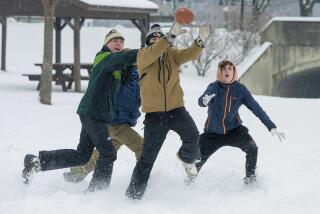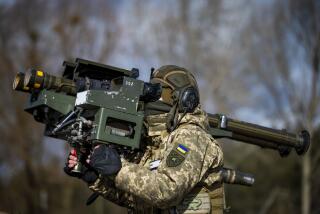Plunged Into a Deep Freeze, Russians Pull on Their Speedos
MOSCOW — In Russia, complaining about the cold in winter is like arguing with the sun for rising -- an exercise for fools, not to mention wimps.
So as the nation staggered in the grip of a fierce Arctic cold wave that stretched from Finland to Japan, the capital braced for a predicted low of minus 35 degrees early today with characteristic defiance: Dozens of Muscovites stripped down to their bathing suits at midnight and plunged into a tributary of the Moscow River.
“God bless Russia!” 28-year-old Gennady Mordvintsev screamed as he dived into a hole in the ice. He emerged, dripping and frosting over quickly, several minutes later.
“This is why Americans can’t understand what a Russian is,” boomed Liberal Democratic Party leader Vladimir V. Zhirinovsky, stuffed in a fur coat and hat and surrounded by bodyguards after his own encounter with the water. “We’ve been doing this for a thousand years!”
The Orthodox holiday of Epiphany was what drew dozens of swimmers out to the water’s edge. But on any given Saturday night, Russians can be seen padding down to the river to dip into the icy water, or stumbling out of their wood-fired banyas, the Russian version of saunas, to plunge headlong and naked into the snow.
All week, there have been frequent reminders that this is the land that left the armies of Napoleon and Hitler foundering in its forbidding frosts.
While Moscow had already hit minus 22 by mid-evening Wednesday, the temperature had sunk to minus 63 in Yakutsk and minus 70 in the Evenk Autonomous Area of Siberia. Power consumption in the capital reached a record 15,760 megawatts by 6 p.m., nearly three times what Los Angeles uses on its hottest summer days.
Twelve people had died of exposure in the Novgorod region by Wednesday, authorities said, and about 100 people had to be evacuated from the village of Yeletsky in the north-central region of Komi when a heating plant failed at 53 degrees below zero.
“When it’s sunny and minus 50, it’s one thing. Children can easily go for a walk. But this is a completely different thing -- we have a snowstorm and a hurricane going on here, and it was minus 39,” said Olga Korolyova, head of administration in Yeletsky.
An eerie, hazy gloom settled over Moscow, as city officials dimmed some streetlights and kiosks to save power, and frozen moisture in the air formed a biting haze, finer than sleet and popularly known as “ice needles.”
Heating plants that pump steam in enormous pipes to apartment buildings all over the city were belching exhaust into the frigid air.
Stray dogs stood shivering on the roadsides, while the city’s alcoholics and homeless -- usually the first casualties of the cold -- were hauled off to jail or ushered into railroad stations and other shelters.
“What Moscow and many other central Russian cities and regions are experiencing now is what we call a deep cold period. Deep cold is dangerous and serious -- it can hit you and hit you seriously before you even know something is happening to you,” said Yuri Vedeneyev, spokesman for the Moscow Emergencies Ministry.
“However, we were warned this was coming well in advance and had sufficient time to prepare for it,” he said.
Meteorologists say a high-pressure zone of Arctic air leaked across the Urals out of Siberia, plunging temperatures in European Russia down to levels normally seen in the colder regions of the east and far north. Moscow was poised to break a record set in 1950, when temperatures fell below minus 22 degrees for three days in a row, said Dmitry Kiktyov, deputy director of the Hydro-Meteorological Center of Russia.
“There has not been an anomaly of such intensity and duration for a long time,” he said.
The freeze coincided with the Epiphany, when thousands of Russians flock to rivers and lakes to immerse themselves as a commemoration of the baptism of Christ. Epiphany is always cold, but this year it was “infernally cold,” said Father Alexei Uminsky of Moscow, who said his wife had ruled out his participation in the ceremony out of concern for his health.
Still, he said, a large and growing number of Russians typically brave the January cold to dunk themselves in water made holy by the holiday blessing.
“People come in expensive cars, they come in incredible off-road vehicles,” he said. “I think first and foremost it is because they miss traditionalism in their lives. They have a desire to return to some roots that have been destroyed.
“And of course, there’s the purely national Russian love for extremes.”
At midnight, a bishop from the Moscow Patriarchate led three other priests and a choir to the banks of a Moscow River tributary known as the Lake Without Bottom, and with the temperature hovering at minus 22, knelt at the edge of the ice and dipped a cross in.
All evening, men and women had been taking turns stripping to their bathing suits and jumping in over their heads; the pace picked up as the throngs who had followed the priests from the church took their turns.
“It was as usual,” said Alexander Maslenikov, a frequent winter swimmer whose glasses and hair began to freeze over with a thin layer of ice as soon as he emerged from the water.
“Initially, I used to get pleasure from it, and then it became a habit,” he said. “You get in there, and then you start cursing -- but it’s impossible not to get in there.”
Mordvintsev pulled himself out of the water, let out a roar and waved his fist in the air. “Sergei, you [so-and-so]!” he shouted at a friend. “I did it!”
Then he turned to an approving crowd. “It was normal, in the Christian tradition -- I recommend that everybody do it,” said the shivering 28-year-old, who identified himself first as a bodybuilder, then as a merchandise loader.
“He’s a gangster,” interjected Valery Gritskov, a rescuer with the Emergencies Ministry who was standing nearby, armed with a pole, ready to hook anyone who drifted under the ice.
Gritskov shook his head, and quoted a line from a famous poem by Fyodor Tyutchev: “You can’t understand Russia with your brain.”
*
Times staff writer Sergei L. Loiko and Yakov Ryzhak and Natasha Yefimova of The Times’ Moscow Bureau contributed to this report.
More to Read
Sign up for Essential California
The most important California stories and recommendations in your inbox every morning.
You may occasionally receive promotional content from the Los Angeles Times.










